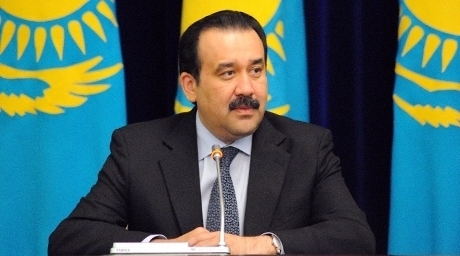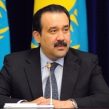
Kazakhstan’s New Prime Minister to Fix Economic Problems
Publication: Eurasia Daily Monitor Volume: 11 Issue: 67
By:

On April 2, Kazakhstani President Nursultan Nazarbayev accepted the resignation of Prime Minister Serik Akhmetov who had headed the country’s government since September 2012. On the same day, the president met with leaders of parliamentary groups to discuss the candidacy of a new prime minister. A few hours later, the parliament unanimously voted in favor of Karim Massimov, Nazarbayev’s chief of staff and Kazakhstan’s former head of government between 2007 and 2012 (akorda.kz, April 2).
As regards the outgoing prime minister, Serik Akhmetov was tapped to become a new minister of defense to replace in this capacity Adilbek Dzhaksybekov. The latter was appointed secretary of state. The previous holder of this mostly ceremonial public office, Marat Tazhin, who is widely known to be President Nazarbayev’s close advisor, recently moved to Moscow as Kazakhstan’s new ambassador. His departure from the country actually occurred on the eve of the forthcoming signing of the Eurasian Economic Union’s founding treaty scheduled for this May (centrasia.ru, April 2; zakon.kz, February 11).
Another Kazakhstani politician who changed his work address last week is Nurlan Nigmatulin, the former speaker of the lower chamber of the country’s parliament. He has become Nursultan Nazarbayev’s chief of staff. While his successor, Kabibula Dzhakupov, is a relatively unknown political figure without strong connections in the high corridors of power, it is worth mentioning Dzhakupov’s new deputy, Dariga Nazarbayeva. She is the president’s elder daughter and one of the most salient members of the influential presidential clan (newskaz.ru, April 3).
To the surprise of many Kazakhstan watchers, the composition of the government has remained almost entirely unchanged. On April 4, Nursultan Nazarbayev reconfirmed all ministers in their previous jobs, except for Akhmetov hence in charge of national defense issues. Thus, it is clear that the cause of the president’s dissatisfaction with the executive has been the lack of efficient management on behalf of the prime minister. “At a time of the global financial crisis, we are confronted with some difficulties. We need to work better with international financial institutions and to attract new investors. All these things require good knowledge of the matter,” Nazarbayev summarized when presenting his choice of Massimov (tengrinews.kz, April 2).
Economic factors are most likely to have been the principal cause of Akhmetov’s resignation. Last year, Kazakhstan’s GDP grew by 6 percent as compared to 5.5 percent one year earlier. However, it increased by over 7.5 percent back in 2011 when Massimov was still prime minister. Since then, Kazakhstan’s macroeconomic situation has been slowly deteriorating, leading the government to go forward with a series of highly unpopular measures (zakon.kz, January 15).
In early 2013, Kazakhstani authorities struggled to pass a controversial pension reform aiming to raise women’s retirement age from 57 to 63 years and to take under state control some $24.5 billion worth of pension savings. Last June, Labor and Social Protection Minister Serik Abdenov paid the price of the government’s growing unpopularity after being dismissed by Nazarbayev. This February, Kazakhstan’s central bank further announced a 20-percent devaluation of the national currency, the tenge, which was met with street protests and calls for the resignation of the country’s chief banker, Kairat Kelimbetov (vlast.kz, February 12, 2014; news.nur.kz, June 10, 2013).
Lingering problems at the Kashagan oil and gas field on the Caspian Sea have also added to the controversy by putting higher odds against Kazakhstan’s economic recovery. While the launch of commercial production at the country’s largest hydrocarbon deposit had to be stopped last September after the discovery of dangerous gas leaks, it has yet to be restored. Despite the North Caspian Operating Company’s declared optimism, it seems that production will remain suspended at least until next year. Some government sources previously said that if Kashagan were to produce no oil in 2014, GDP growth might ultimately be lower than 6 percent. One of the primary tasks before the new Massimov government will, therefore, be to accelerate repair works at the deposit to produce the first oil flows as soon as possible (inform.kz, September 26, 2013).
On a broader scale, the Massimov government will need to work on the implementation of the “Kazakhstan 2050” strategy, which was unveiled by President Nazarbayev in December 2012. It aims to draw the country closer to the elite club of the world’s 30 most advanced economies, especially with regard to Kazakhstan’s economic diversification program with a special focus on innovative technologies. While the realization of various measures proposed by the strategy may prove arduous in the face of current economic challenges, Karim Massimov has built the reputation of a successful “anti-crisis manager,” as he is sometimes called in the local press (kapital.kz, April 2).
As far as Kazakhstan’s power politics is concerned, Serik Akhmetov’s resignation and the changes it has entailed will clearly weaken the positions of the Karaganda clan of which Akhmetov himself is an informal leader. Under the Constitution, the speaker of the upper house of parliament, a position currently held by Kassym-Jomart Tokayev, is next in line to the presidency; but the speaker of the lower chamber of the parliament and the prime minister are respectively second and third in line of succession to the president in case of his death or resignation. With both Akhmetov and Nigmatulin leaving their previous positions, the Karaganda clan has consequently lost control of these two strategic offices. At the same time, Dariga Nazarbayeva’s election as vice-speaker of the parliament’s lower chamber has reinforced the standing of the presidential clan.




